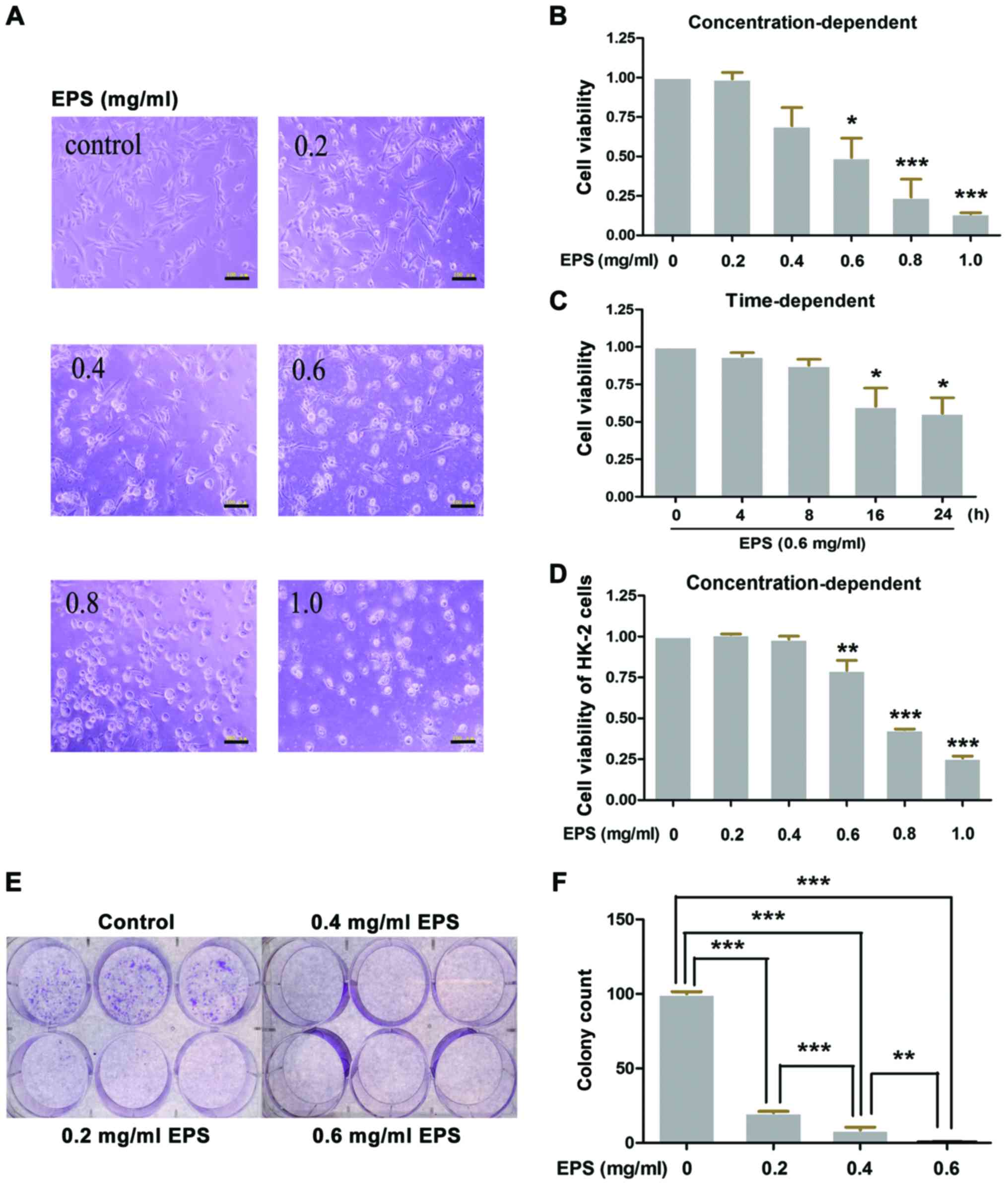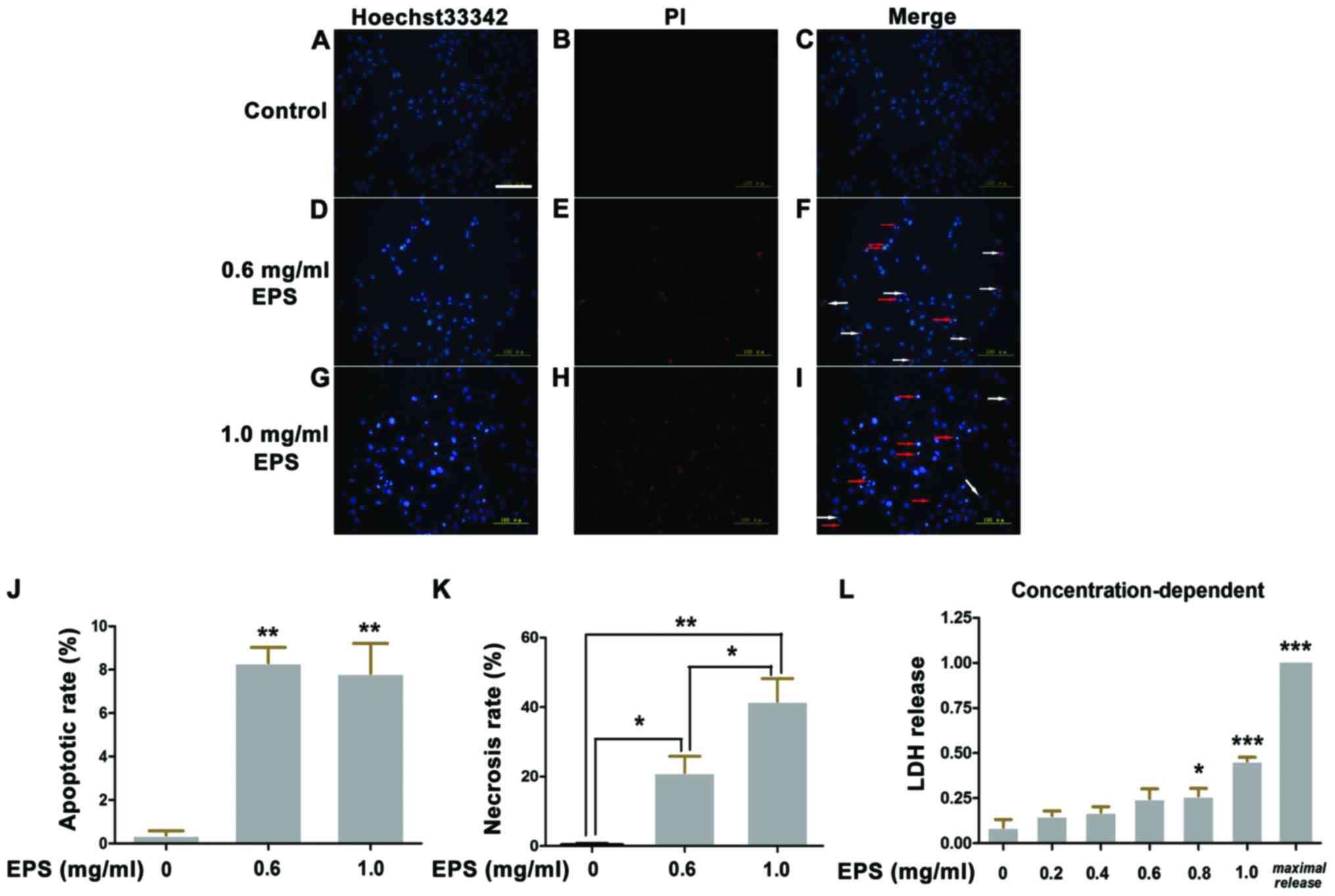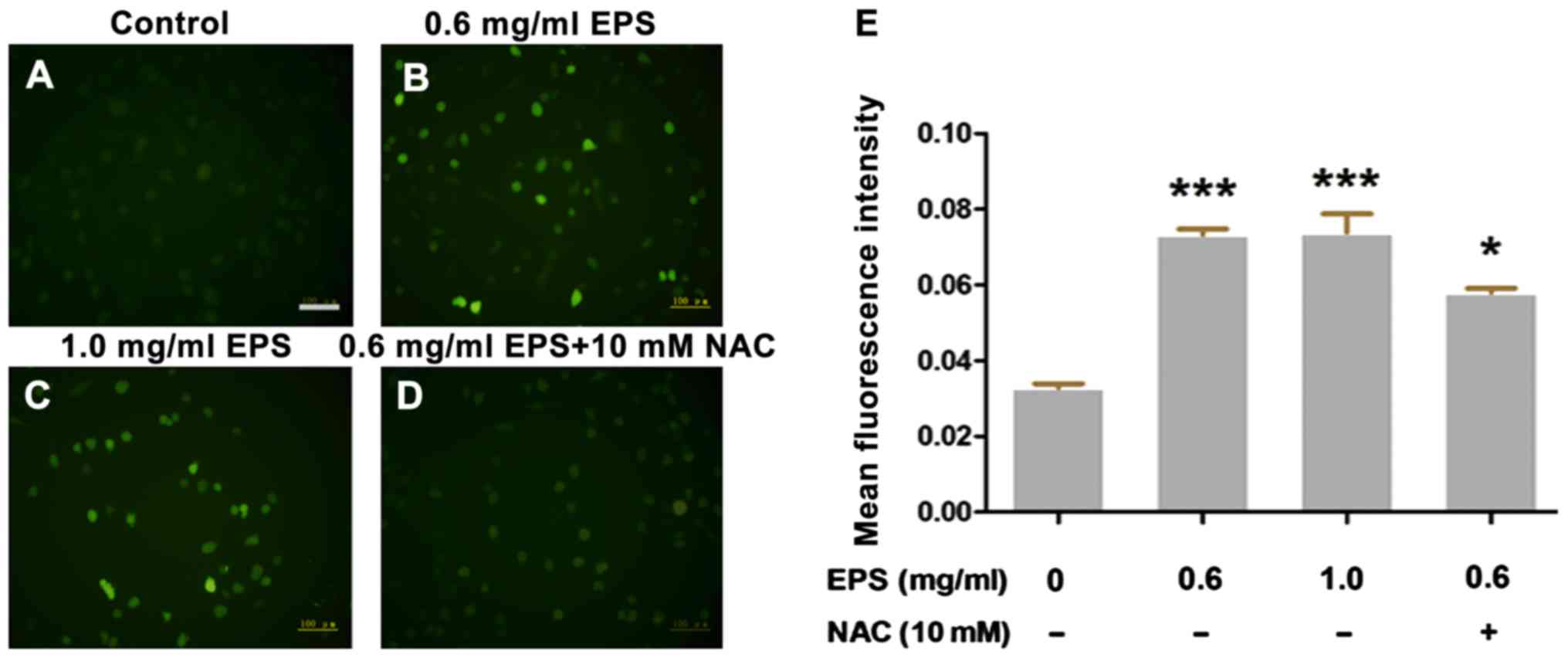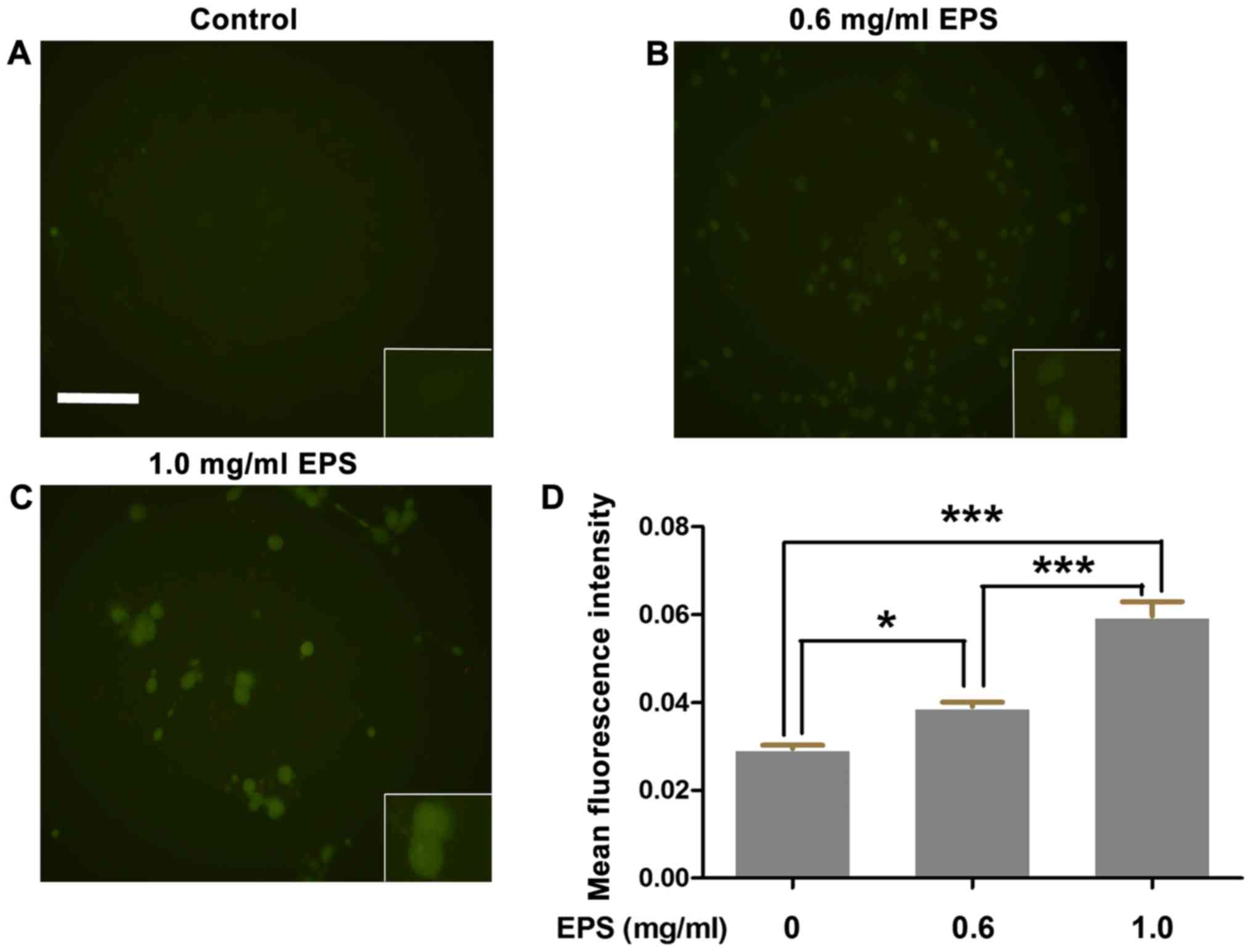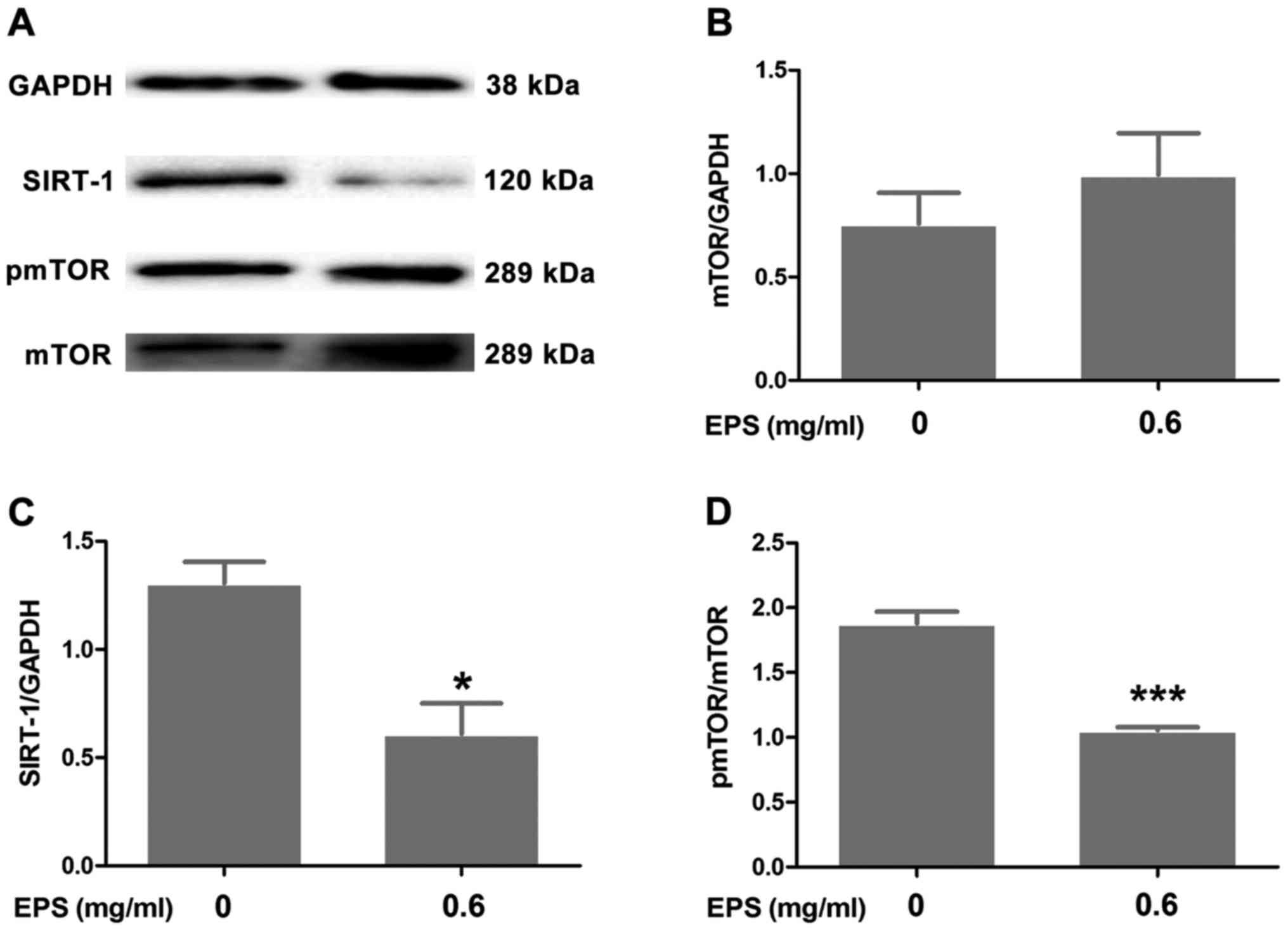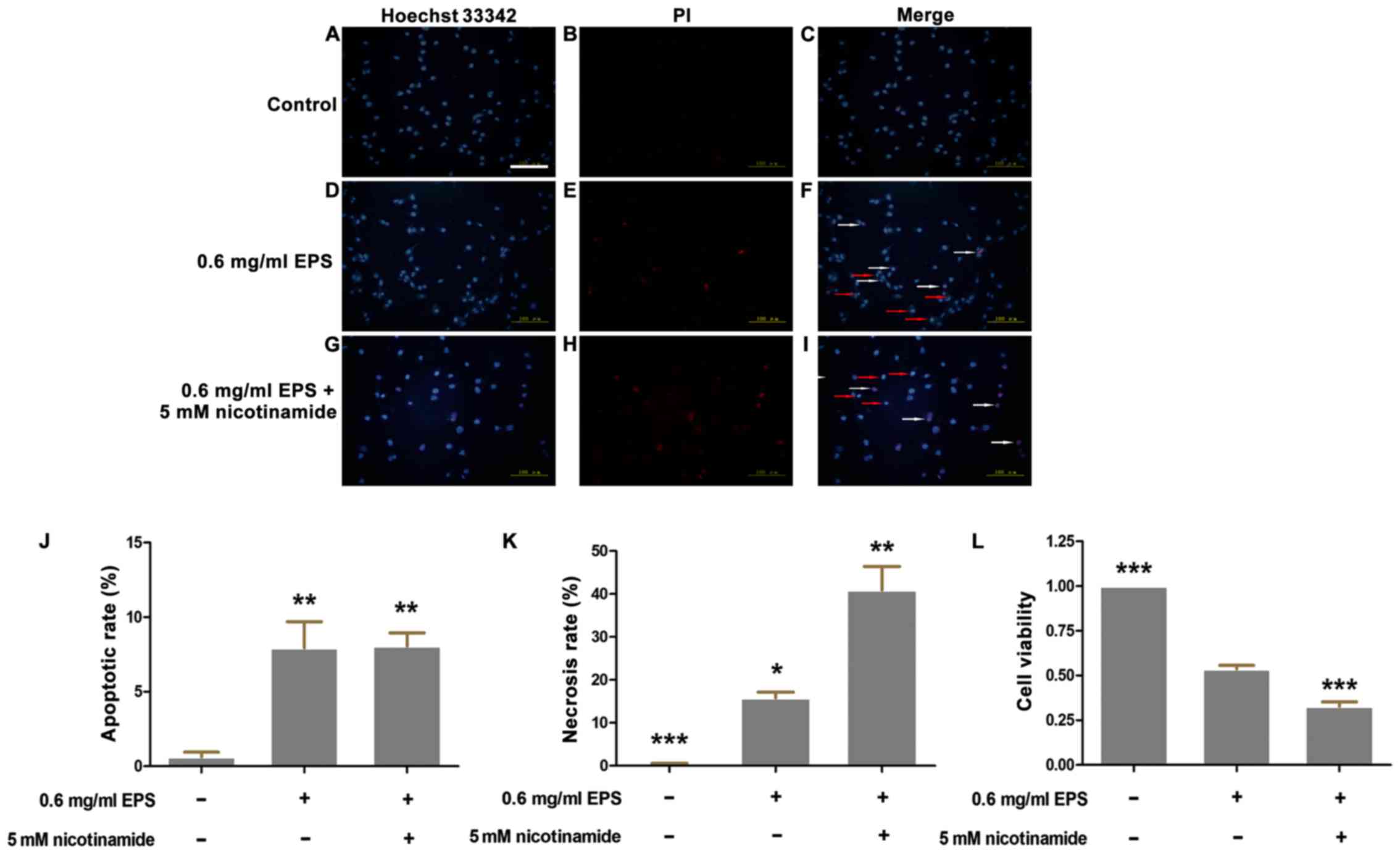|
1
|
Kan XX, Li Q, Chen X, Wang YJ, Li YJ, Yang
Q, Xiao HB, Wang ZX, Chen Y, Weng XG, et al: A novel cell cycle
blocker extracted from Stellera chamaejasme L. inhibits the
proliferation of hepatocarcinoma cells. Oncol Rep. 35:3480–3488.
2016. View Article : Google Scholar : PubMed/NCBI
|
|
2
|
Gordaliza M: Natural products as leads to
anticancer drugs. Clin Transl Oncol. 9:767–776. 2007. View Article : Google Scholar : PubMed/NCBI
|
|
3
|
Brglez Mojzer E, Knez Hrnčič M, Škerget M,
Knez Ž and Bren U: Polyphenols: Extraction methods, antioxidative
action, bioavailability and anticarcinogenic effects. Molecules.
21:212016. View Article : Google Scholar
|
|
4
|
Lin J, Cai QY, Xu W, Lin JM and Peng J:
Chemical composition, anticancer, anti-neuroinflammatory, and
antioxidant activities of the essential oil of Patrinia
scabiosaefolia. Chin J Integr Med. Sep 1–2016.(Epub ahead of
print). View Article : Google Scholar
|
|
5
|
Cho EJ, Shin JS, Noh YS, Cho YW, Hong SJ,
Park JH, Lee JY, Lee JY and Lee KT: Anti-inflammatory effects of
methanol extract of Patrinia scabiosaefolia in mice with ulcerative
colitis. J Ethnopharmacol. 136:428–435. 2011. View Article : Google Scholar : PubMed/NCBI
|
|
6
|
Zhang M, Sun G, Shen A, Liu L, Ding J and
Peng J: Patrinia scabiosaefolia inhibits the proliferation of
colorectal cancer in vitro and in vivo via G1/S cell cycle arrest.
Oncol Rep. 33:856–860. 2015. View Article : Google Scholar : PubMed/NCBI
|
|
7
|
Ju HK, Baek SH, An RB, Bae K, Son KH, Kim
HP, Kang SS, Lee SH, Son JK and Chang HW: Inhibitory effects of
nardostachin on nitric oxide, prostaglandin E2, and tumor necrosis
factor-α production in lipopolysaccharide activated macrophages.
Biol Pharm Bull. 26:1375–1378. 2003. View Article : Google Scholar : PubMed/NCBI
|
|
8
|
Chen L, Liu L, Ye L, Shen A, Chen Y,
Sferra TJ and Peng J: Patrinia scabiosaefolia inhibits colorectal
cancer growth through suppression of tumor angiogenesis. Oncol Rep.
30:1439–1443. 2013. View Article : Google Scholar : PubMed/NCBI
|
|
9
|
Peng J, Chen Y, Lin J, Zhuang Q, Xu W,
Hong Z and Sferra TJ: Patrinia scabiosaefolia extract suppresses
proliferation and promotes apoptosis by inhibiting the STAT3
pathway in human multiple myeloma cells. Mol Med Rep. 4:313–318.
2011.PubMed/NCBI
|
|
10
|
Chiu LC, Ho TS, Wong EY and Ooi VE: Ethyl
acetate extract of Patrinia scabiosaefolia downregulates
anti-apoptotic Bcl-2/Bcl-XL expression, and induces apoptosis in
human breast carcinoma MCF-7 cells independent of caspase-9
activation. J Ethnopharmacol. 105:263–268. 2006. View Article : Google Scholar : PubMed/NCBI
|
|
11
|
Schulze A and Harris AL: How cancer
metabolism is tuned for proliferation and vulnerable to disruption.
Nature. 491:364–373. 2012. View Article : Google Scholar : PubMed/NCBI
|
|
12
|
Trachootham D, Alexandre J and Huang P:
Targeting cancer cells by ROS-mediated mechanisms: A radical
therapeutic approach? Nat Rev Drug Discov. 8:579–591. 2009.
View Article : Google Scholar : PubMed/NCBI
|
|
13
|
Panieri E and Santoro MM: ROS homeostasis
and metabolism: A dangerous liason in cancer cells. Cell Death Dis.
7:e22532016. View Article : Google Scholar : PubMed/NCBI
|
|
14
|
Yan Y, Wei CL, Zhang WR, Cheng HP and Liu
J: Cross-talk between calcium and reactive oxygen species
signaling. Acta Pharmacol Sin. 27:821–826. 2006. View Article : Google Scholar : PubMed/NCBI
|
|
15
|
Ganie SA, Dar TA, Bhat AH, Dar KB, Anees
S, Zargar MA and Masood A: Melatonin: A potential anti-oxidant
therapeutic agent for mitochondrial dysfunctions and related
disorders. Rejuvenation Res. 19:21–40. 2016. View Article : Google Scholar : PubMed/NCBI
|
|
16
|
Li Z, Wang H, Wang Q and Sun J: Buyang
Huanwu decoction vigorously rescues PC12 cells against
6-OHDA-induced neurotoxicity via Akt/GSK3β pathway based on serum
pharmacology methodology. Rejuvenation Res. 19:467–477. 2016.
View Article : Google Scholar : PubMed/NCBI
|
|
17
|
Ghosh HS, McBurney M and Robbins PD: SIRT1
negatively regulates the mammalian target of rapamycin. PLoS One.
5:e91992010. View Article : Google Scholar : PubMed/NCBI
|
|
18
|
Zhang ZY, Hong D, Nam SH, Kim JM, Paik YH,
Joh JW, Kwon CH, Park JB, Choi GS, Jang KY, et al: SIRT1 regulates
oncogenesis via a mutant p53-dependent pathway in hepatocellular
carcinoma. J Hepatol. 62:121–130. 2015. View Article : Google Scholar : PubMed/NCBI
|
|
19
|
Liu Z, Gu H, Gan L, Xu Y, Feng F, Saeed M
and Sun C: Reducing Smad3/ATF4 was essential for Sirt1 inhibiting
ER stress-induced apoptosis in mice brown adipose tissue.
Oncotarget. 8:9267–9279. 2017.PubMed/NCBI
|
|
20
|
Jang KY, Hwang SH, Kwon KS, Kim KR, Choi
HN, Lee NR, Kwak JY, Park BH, Park HS, Chung MJ, et al: SIRT1
expression is associated with poor prognosis of diffuse large
B-cell lymphoma. Am J Surg Pathol. 32:1523–1531. 2008. View Article : Google Scholar : PubMed/NCBI
|
|
21
|
Chen HC, Jeng YM, Yuan RH, Hsu HC and Chen
YL: SIRT1 promotes tumorigenesis and resistance to chemotherapy in
hepatocellular carcinoma and its expression predicts poor
prognosis. Ann Surg Oncol. 19:2011–2019. 2012. View Article : Google Scholar : PubMed/NCBI
|
|
22
|
Lee H, Kim KR, Noh SJ, Park HS, Kwon KS,
Park BH, Jung SH, Youn HJ, Lee BK, Chung MJ, et al: Expression of
DBC1 and SIRT1 is associated with poor prognosis for breast
carcinoma. Hum Pathol. 42:204–213. 2011. View Article : Google Scholar : PubMed/NCBI
|
|
23
|
Dibble CC and Cantley LC: Regulation of
mTORC1 by PI3K signaling. Trends Cell Biol. 25:545–555. 2015.
View Article : Google Scholar : PubMed/NCBI
|
|
24
|
Zoncu R, Efeyan A and Sabatini DM: mTOR:
From growth signal integration to cancer, diabetes and ageing. Nat
Rev Mol Cell Biol. 12:21–35. 2011. View Article : Google Scholar : PubMed/NCBI
|
|
25
|
Menendez JA and Lupu R: Fatty acid
synthase and the lipogenic phenotype in cancer pathogenesis. Nat
Rev Cancer. 7:763–777. 2007. View Article : Google Scholar : PubMed/NCBI
|
|
26
|
Liu L, Shen A, Chen Y, Wei L, Lin J,
Sferra TJ, Hong Z and Peng J: Patrinia scabiosaefolia induces
mitochondrial-dependent apoptosis in a mouse model of colorectal
cancer. Oncol Rep. 30:897–903. 2013. View Article : Google Scholar : PubMed/NCBI
|
|
27
|
Cairns RA, Harris IS and Mak TW:
Regulation of cancer cell metabolism. Nat Rev Cancer. 11:85–95.
2011. View Article : Google Scholar : PubMed/NCBI
|
|
28
|
Liu X, Yang T, Sun T and Shao K:
SIRT1mediated regulation of oxidative stress induced by Pseudomonas
aeruginosa lipopolysaccharides in human alveolar epithelial cells.
Mol Med Rep. 15:813–818. 2017. View Article : Google Scholar : PubMed/NCBI
|
|
29
|
Li B, He X, Zhuang M, Niu B, Wu C, Mu H,
Tang F, Cui Y, Liu W, Zhao B, et al: Melatonin ameliorates
busulfan-induced spermatogonial stem cell oxidative apoptosis in
mouse testes. Antioxid Redox Signal. Jan. 27–2017.(Epub ahead of
print). View Article : Google Scholar :
|
|
30
|
Park EY, Woo Y, Kim SJ, Kim DH, Lee EK, De
U, Kim KS, Lee J, Jung JH, Ha KT, et al: Anticancer effects of a
new SIRT inhibitor, MHY2256, against human breast cancer MCF-7
cells via regulation of MDM2-p53 binding. Int J Biol Sci.
12:1555–1567. 2016. View Article : Google Scholar : PubMed/NCBI
|
|
31
|
Zhang S, Huang S, Deng C, Cao Y, Yang J,
Chen G, Zhang B, Duan C, Shi J, Kong B, et al: Co-ordinated
overexpression of SIRT1 and STAT3 is associated with poor survival
outcome in gastric cancer patients. Oncotarget. 8:18848–18860.
2017.PubMed/NCBI
|
|
32
|
Jang KY, Kim KS, Hwang SH, Kwon KS, Kim
KR, Park HS, Park BH, Chung MJ, Kang MJ, Lee DG, et al: Expression
and prognostic significance of SIRT1 in ovarian epithelial tumours.
Pathology. 41:366–371. 2009. View Article : Google Scholar : PubMed/NCBI
|
|
33
|
Kim I, Rodriguez-Enriquez S and Lemasters
JJ: Selective degradation of mitochondria by mitophagy. Arch
Biochem Biophys. 462:245–253. 2007. View Article : Google Scholar : PubMed/NCBI
|
|
34
|
Brachmann SM, Hofmann I, Schnell C,
Fritsch C, Wee S, Lane H, Wang S, Garcia-Echeverria C and Maira SM:
Specific apoptosis induction by the dual PI3K/mTor inhibitor
NVP-BEZ235 in HER2 amplified and PIK3CA mutant breast cancer cells.
Proc Natl Acad Sci USA. 106:pp. 22299–22304. 2009; View Article : Google Scholar : PubMed/NCBI
|
|
35
|
Chen J, Yuan J, Zhou L, Zhu M, Shi Z, Song
J, Xu Q, Yin G, Lv Y, Luo Y, et al: Regulation of different
components from Ophiopogon japonicus on autophagy in human lung
adenocarcinoma A549 cells through PI3K/Akt/mTOR signaling pathway.
Biomed Pharmacother. 87:118–126. 2017. View Article : Google Scholar : PubMed/NCBI
|
|
36
|
Lin F, Lei S, Ma J, et al: [Inhibitory
effect of jianpi-jiedu prescription-contained serum on colorectal
cancer SW48 cell proliferation by mTOR-P53-P21 signalling pathway].
Zhong Nan Da Xue Xue Bao Yi Xue Ban. 41:1128–1136. 2016.(abstract
in English). PubMed/NCBI
|
|
37
|
Wu J, Zhu D, Zhang J, Li G, Liu Z and Sun
J: Lithium protects against methamphetamine-induced neurotoxicity
in PC12 cells via Akt/GSK3β/mTOR pathway. Biochem Biophys Res
Commun. 465:368–373. 2015. View Article : Google Scholar : PubMed/NCBI
|
|
38
|
Guo W, Qian L, Zhang J, Zhang W, Morrison
A, Hayes P, Wilson S, Chen T and Zhao J: Sirt1 overexpression in
neurons promotes neurite outgrowth and cell survival through
inhibition of the mTOR signaling. J Neurosci Res. 89:1723–1736.
2011. View Article : Google Scholar : PubMed/NCBI
|
|
39
|
Zhou ZW, Li XX, He ZX, Pan ST, Yang Y,
Zhang X, Chow K, Yang T, Qiu JX, Zhou Q, et al: Induction of
apoptosis and autophagy via sirtuin1- and PI3K/Akt/mTOR-mediated
pathways by plumbagin in human prostate cancer cells. Drug Des
Devel Ther. 9:1511–1554. 2015. View Article : Google Scholar : PubMed/NCBI
|
|
40
|
Son Y, Cheong YK, Kim NH, Chung HT, Kang
DG and Pae HO: Mitogen-activated protein kinases and reactive
oxygen species: How can ROS activate MAPK pathways? J Signal
Transduct 2011. 7926392011.
|
|
41
|
Gao L, Zhang L, Li N, Liu JY, Cai PL and
Yang SL: New triterpenoid saponins from Patrinia scabiosaefolia.
Carbohydr Res. 346:2881–2885. 2011. View Article : Google Scholar : PubMed/NCBI
|
|
42
|
Taguchi H and Endo T: Letter: Patrinoside,
a new iridoid glycoside from Patrinia scabiosaefolia. Chem Pharm
Bull. 22:1935–1937. 1974. View Article : Google Scholar : PubMed/NCBI
|
|
43
|
Nakanishi T, Tanaka K, Murata H, Somekawa
M and Inada A: Phytochemical studies of seeds of medicinal plants.
III. Ursolic acid and oleanolic acid glycosides from seeds of
Patrinia scabiosaefolia Fischer. Chem Pharm Bull. 41:183–186. 1993.
View Article : Google Scholar : PubMed/NCBI
|
|
44
|
Choi JS and Woo WS: Triterpenoid
glycosides from the roots of Patrinia scabiosaefolia. Planta Med.
53:62–65. 1987. View Article : Google Scholar : PubMed/NCBI
|
|
45
|
Inada A, Yamada M, Murata H, Kobayashi M,
Toya H, Kato Y and Nakanishi T: Phytochemical studies of seeds of
medicinal plants. I. Two sulfated triterpenoid glycosides,
sulfapatrinosides I and II, from seeds of Patrinia scabiosaefolia
FISCHER. Chem Pharm Bull. 36:4269–4274. 1988. View Article : Google Scholar : PubMed/NCBI
|
|
46
|
Yang MY, Choi YH, Yeo H and Kim J: A new
triterpene lactone from the roots of Patrinia scabiosaefolia. Arch
Pharm Res. 24:416–417. 2001. View Article : Google Scholar : PubMed/NCBI
|















